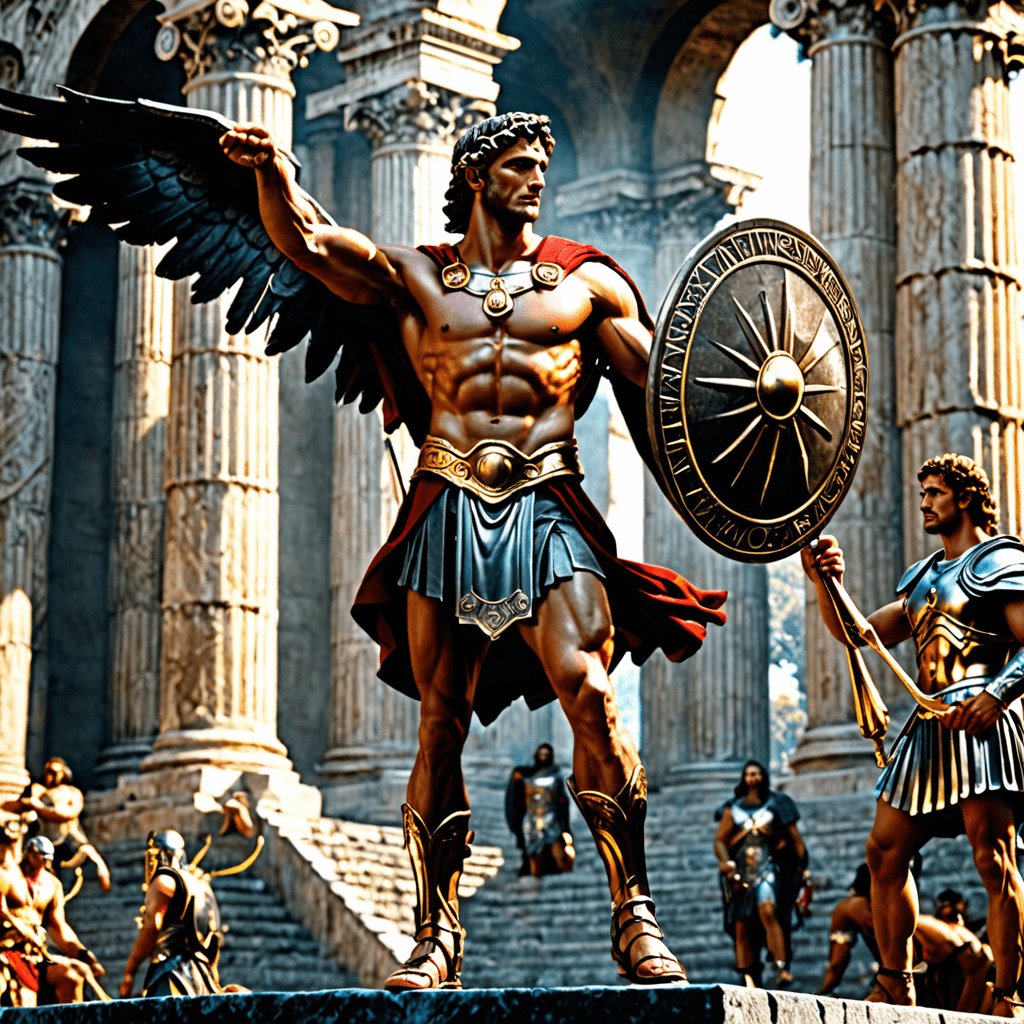The Heavenly Maiden and the Woodcutter: A Korean Myth of Love and Loss
In the realm of Korean mythology, the tale of the Heavenly Maiden and the Woodcutter stands as a poignant and enduring story that speaks to the universal themes of love, loss, and the power of nature. This enchanting myth, passed down through generations, transports us to a world of celestial beings, forbidden romance, and the bittersweet beauty of sacrifice. The story's enduring appeal lies in its exploration of the complexities of human emotions and the timeless conflict between the earthly and the divine.
Origin and Significance of the Myth
The origins of the Heavenly Maiden and the Woodcutter myth are deeply rooted in Korean folklore, reflecting a rich cultural heritage and a profound respect for nature. The story likely emerged during the Joseon Dynasty (1392-1910), a period marked by a flourishing of Korean arts and literature.
This myth, like many others, serves as a cautionary tale, highlighting the dangers of transgression and the consequences of defying the natural order. It also serves as a powerful reminder of the enduring human desire for love and connection, even when faced with overwhelming obstacles.
The Tale’s Setting: Mount Geumgang and the Heavenly Realm
The story unfolds amidst the breathtaking beauty of Mount Geumgang, a majestic mountain range considered to be one of Korea's most sacred sites. Mount Geumgang, with its towering peaks and cascading waterfalls, is believed to be the gateway to the heavenly realm, where celestial beings reside. It's a place of extraordinary natural beauty and spiritual significance, setting the stage for the magical encounter between the woodcutter and the heavenly maiden.
The heavenly realm, in Korean mythology, is a place of ethereal beauty and divine beings. It is a realm beyond human comprehension, where time and space are irrelevant and where the power of the divine reigns supreme. It's a place where humans are forbidden to venture, for it is a realm of celestial beings, protected by ancient laws and mystical forces.
The Woodcutter’s Discovery: A Celestial Visitor
Once upon a time, a humble woodcutter named lived in the foothills of Mount Geumgang. One day, as he was gathering wood in the forest, he stumbled upon a breathtaking sight: a beautiful maiden, bathed in celestial light, descending from the heavens. She was clothed in shimmering white garments and emanated a radiant glow. The woodcutter was mesmerized by her beauty and ethereal presence. He was immediately struck by the maiden's otherworldly beauty and the strange power she seemed to possess.
The maiden, who was named, was a celestial being from the heavenly realm. She had been sent to Earth on a special mission, and her descent to the mortal realm was a rare and extraordinary event. The woodcutter, immediately felt a deep connection to the maiden, drawn to her kindness and compassion.
The Maiden’s Transformation: From Heavenly Being to Mortal Woman
The maiden, was bound by the laws of the heavenly realm, which forbade her from revealing her true identity to mortals, let alone engaging in romantic entanglements. However, was captivated by the woodcutter's kindness and the simple beauty of his life. She longed to experience the human world, to taste the joys and sorrows of mortal existence.
Feeling a deep connection to , decided to shed her celestial form and become a mortal woman. She shed her shimmering garments and took on the appearance of a mortal woman, her beauty remaining undiminished. With her transformation complete, the maiden, now known as, was free to fully experience the world of humans.
The Woodcutter’s Love: A Forbidden Romance
The woodcutter, deeply smitten with , was overjoyed to have her by his side. They spent their days together, sharing stories, laughter, and the simple joys of life. The woodcutter's love for was pure and unwavering. He was captivated by her kindness, her gentle spirit, and her unwavering love for him. Their bond deepened with each passing day, and they soon fell deeply in love. Their love was a forbidden romance, a union of the heavenly and the earthly, an impossible dream.
However, their love was forbidden. The woodcutter was a mortal man, bound by the laws of the earthly realm. And was a celestial being, subject to the rules of the heavenly realm. Their love was a transgression of the natural order, a defiance of the laws that governed their existence.
The Heavenly Intervention: The Maiden’s Recall
The Heavenly Realm, however, was not unaware of what was happening. The celestial beings were angered by 's transgression. They knew that her love for the woodcutter was a violation of the celestial laws, and that her presence in the mortal realm was disrupting the balance of the universe.
The Heavenly King, the ruler of the celestial realm, sent a messenger to Earth, demanding 's immediate return. The messenger appeared before the couple, a celestial being of immense power and authority. He informed that her time on Earth was over, and that she must return to the Heavenly Realm. The woodcutter was heartbroken by the news, knowing that he would never see again. He pleaded with the messenger, begging him to allow to stay, but his pleas were in vain.
The Woodcutter’s Desperation: Seeking to Join His Love
Desperate to be with his beloved, the woodcutter resolved to find a way to join in the Heavenly Realm. He knew that it was a dangerous and impossible task, but he was willing to risk everything for the chance to be with her.
The woodcutter journeyed to Mount Geumgang, the gateway to the Heavenly Realm. He climbed to the highest peak, seeking to reach the heavens. He cried out to the gods, begging them to grant him passage to the Heavenly Realm. He performed acts of selflessness and kindness, hoping that his good deeds would earn him favor in the eyes of the celestial beings. He was determined to find a way to be with his beloved, even if it meant sacrificing everything.
The Tragic Ending: A Heavenly Reunion, But a Mortal Loss
The woodcutter's relentless pursuit of touched the hearts of the celestial beings. They recognized his pure love and his unwavering devotion to her. But, while they were moved by his love, the laws of the Heavenly Realm were immutable.
The gods, moved by the woodcutter's devotion, agreed to grant him a final meeting with . He was transported to the Heavenly Realm, where he reunited with his beloved. They were allowed to spend a brief moment together, a final farewell before, in accordance with the rules of the Heavenly Realm, was returned to her celestial form.
The woodcutter, however, was trapped in the Heavenly Realm, unable to return to his mortal life. The gods granted him a place among them, a place of honor and respect, but his heart remained with . The woodcutter remained in the Heavenly Realm, forever yearning for his lost love, a poignant reminder of the enduring power of love and the tragic consequences of defying the laws of nature.
Themes of the Myth: Love, Loss, and the Power of Nature
The myth of the Heavenly Maiden and the Woodcutter explores several universal themes, reflecting the timeless human experience:
- Love: The story celebrates the transformative power of love, the ability to transcend mortal boundaries and challenge the divine. The woodcutter's love for is a force that drives him to unbelievable lengths, highlighting the depth of human emotion.
- Loss: The myth speaks to the reality of loss and the enduring pain it brings. The woodcutter's loss of is a reminder that love is not always enough to overcome the limitations of life.
- The Power of Nature: The setting of Mount Geumgang, the gateway to the Heavenly Realm, emphasizes the profound connection between humans and nature. It serves as a reminder of the natural order and the consequences of defying it.
Interpretations and Theories: A Love Story or a Warning?
The Heavenly Maiden and the Woodcutter myth can be interpreted in several ways. It can be seen as a poignant love story, highlighting the enduring power of love in the face of adversity. But it also can be viewed as a cautionary tale, warning against the dangers of defying the natural order and the consequences of transgression against the divine.
The story's enduring appeal lies in its ability to resonate with readers on an emotional level, reminding us of the complexities of love, loss, and the power of nature. It's a story that reminds us that love can be a powerful force, capable of transcending boundaries and defying the laws of nature, but also that it can lead to tragedy and loss.
FAQ
What is the significance of the Heavenly Maiden and the Woodcutter myth in Korean culture?
The Heavenly Maiden and the Woodcutter myth is a significant part of Korean folklore. It reflects a deep respect for nature, a belief in celestial beings, and a recognition of the power of love. The myth serves as a cautionary tale, highlighting the dangers of transgression and the consequences of defying the natural order.
What are the key takeaway messages of the myth?
The myth emphasizes the enduring power of love, the reality of loss, and the importance of respecting the natural order. It reminds us that love can be a powerful force, but also that it can be a source of pain and sorrow. It also warns against the dangers of defying the laws of nature and the consequences of transgressing the divine.
How is the myth related to Korean beliefs and traditions?
The myth draws on Korean beliefs about the Heavenly Realm, celestial beings, and the sanctity of nature. Mount Geumgang, the setting of the story, is a sacred site in Korean culture, believed to be the gateway to the Heavenly Realm. The myth also reflects Korean traditions of storytelling and the importance of passing down cultural heritage through generations.
What are some of the themes explored in the myth?
The story explores themes of love, loss, transgression, and the power of nature. It examines the complexities of human emotions, the consequences of defying the natural order, and the enduring power of love in the face of adversity.
Is the myth a love story or a warning?
The myth can be interpreted in multiple ways. It can be seen as a tragic love story, highlighting the enduring power of love, but it can also be viewed as a cautionary tale, warning against the dangers of defying the natural order.




